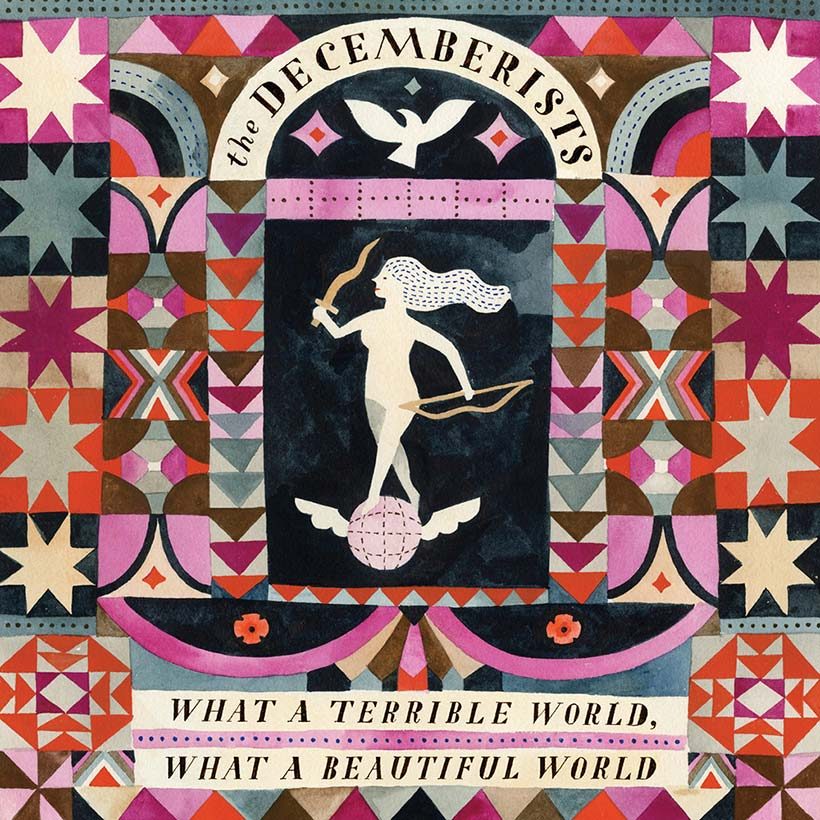‘What A Terrible World, What A Beautiful World’: The Decemberists’ Concept-Free Classic
With ‘What A Terrible World, What A Beautiful World,’ The Decemberists took a more free-form approach to ‘see what happened.’

The Decemberists had nothing to prove when they released their seventh album, What A Terrible World, What A Beautiful World, on January 20, 2015. The Oregon-based folk-rock band, fronted by singer and go-to songwriter Colin Meloy, had amassed an acclaimed back catalogue of records dating back to 2002’s Castaways And Cutouts, earning a devoted following worldwide with their idiosyncratic brand of eloquent, literary lyrics and genre-crossing music.
Listen to What A Terrible World, What A Beautiful World on Apple Music and Spotify.
The concept-free approach
Most of the songs for What A Terrible World… were written during the band’s hiatus after 2011’s The King Is Dead, and the recording process took on a free-form approach that relied heavily on collaboration. Meloy, along with guitarist Chris Funk, pianist (and multi-instrumentalist) Jenny Conlee, bass player Nate Query and drummer John Moen, simply gathered in the studio and let themselves play.
“Often the band didn’t even hear demos,” revealed Meloy in an interview with Radio.com, adding that they “didn’t really know what songs we would be recording. We just showed up, all sat together in the room and I would throw some songs out there and we’d see what happened.”
Producer Tucker Martine saw that much of the album was tracked live, and Meloy has described the record as an enthusiastic reversion to old ways, after the pared-down joys of their roots-infused previous effort, The King Is Dead, which the singer had deemed “an exercise in restraint.”
While many of their previous releases were considered to be concept albums – such as 2006’s The Crane Wife, which draws upon the Japanese folktale tradition – What A Terrible World… was conceived as a radical change of pace. It was to be, as Meloy called it, “concept-free.”
The themes that emerged
While there was no great unifying concept behind the album, a few similar themes echo throughout its 14 tracks. What A Terrible World…’s title comes from a line in the penultimate song, “12/17/12,” written about the Sandy Hook school shooting. In the song, Meloy struggles to reconcile the monstrous evil in the world with his own personal state of satisfaction. This idea, of a binary world made up of both beauty and horror, can be seen under the surface of several other tracks.
“Cavalry Captain,” the jubilant second song on the album, evokes the famous Charge Of The Light Brigade, the fatal military maneuver that was immortalized in Alfred Lord Tennyson’s poem, finding, in this last life-ending stand, a sense of valor.
The lyrics to “Philomena” are some of the dirtiest The Decemberists have ever committed to record. With backing vocals from Rachel Flotard and Kelly Hogan, the short track juxtaposes a jaunty, 50s-influenced melody with metaphors for female genitalia and risqué lyrics about oral sex. The tone swerves back towards the mainstream for the following track, “Make You Better,” a moving, pop-ish ballad that was released as the album’s first single.
All the more beautiful…
What A Terrible World… keeps some of the band’s more bookish pretensions in check, but they are allowed free rein on “Lake Song,” a self-parodic song written from the perspective of a spurned lover. “And you, all sibylline, reclining in your pew/You tattered me, you tethered me to you,” sings Meloy, indulging his fascination with language.
“Anti-Summersong” is an even more direct engagement with the Decemberists’ past – written as a response to (and rebuke of) some of their flightier seasonal songs, most notably “Summersong,” which featured on The Crane Wife. Meloy had also sung about summer in tracks like “July, July” and “June Hymn.” “Anti-Summersong” includes a sweeping string section and some fine harmonica playing from Meloy himself.
The album is full of other highlights, including the traditionally folky “Carolina Low,” the minor-key “Better Not Wake The Baby” and the sea-shantyish “Easy Come, Easy Go.” But it is perhaps What A Terrible World…’s final track, “A Beginning Song,” that resonates most deeply – a poetic, affirming reflection on some of the album’s themes. Listening to this, it is easy to believe that it truly is a beautiful world – all the more so for The Decemberists’ triumphant album.
What A Terrible World, What A Beautiful World can be bought here.












